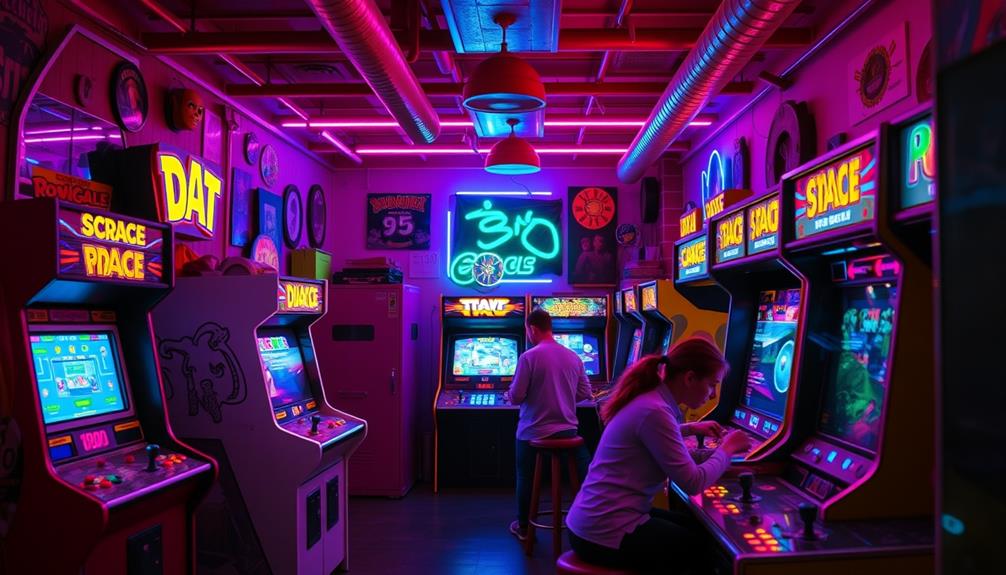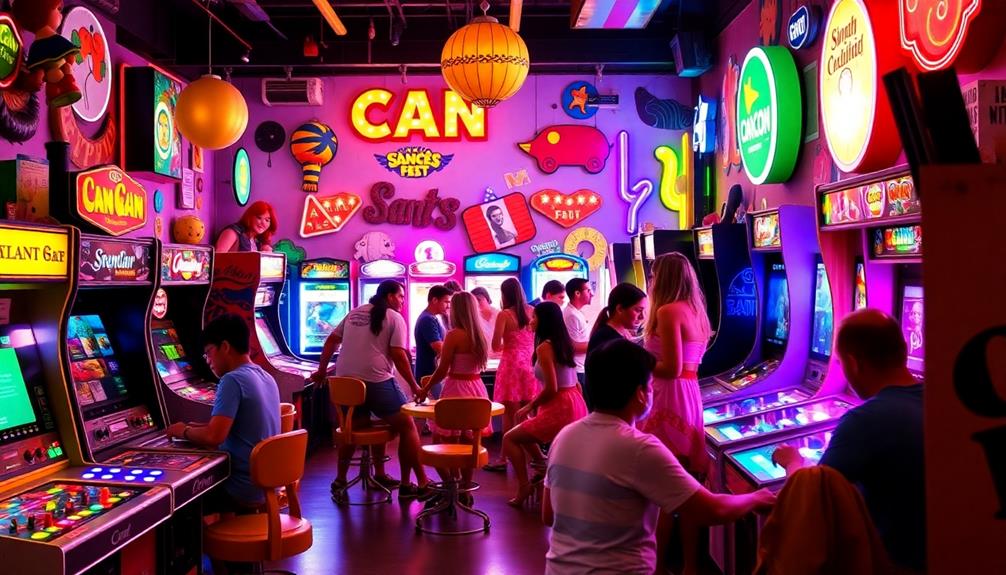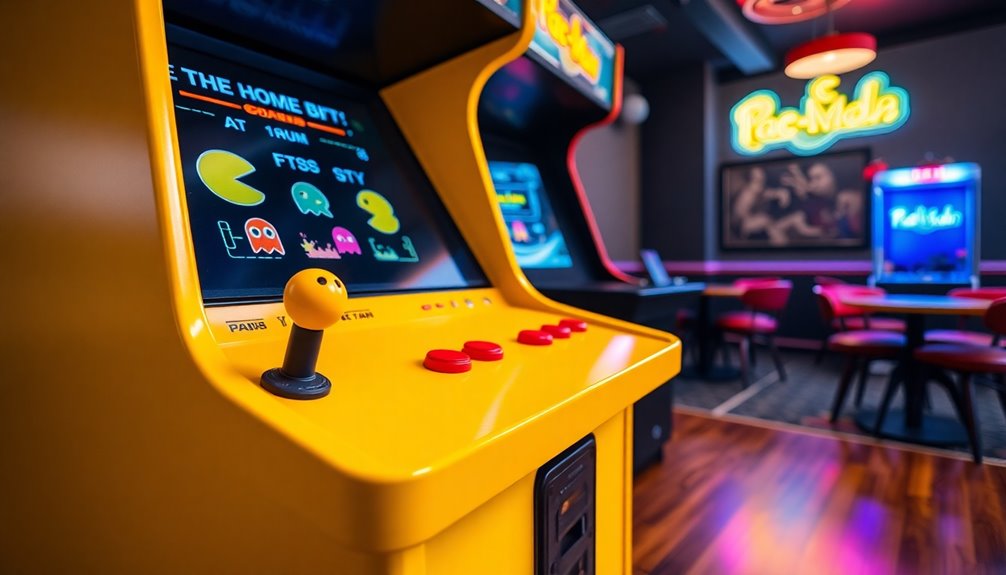Arcade games made their debut in 1971 with the release of Computer Space. This marked a significant change in entertainment, evolving from traditional coin-operated games to video arcade gaming. Just a year later, Pong hit the scene and quickly became a sensation, paving the way for future arcade classics. The late '70s and early '80s saw the Golden Age of Arcades, introducing iconic titles like Space Invaders and Pac-Man. Your journey into the fascinating world of arcade history has just begun, and there's much more to uncover about its development and impact on gaming culture. Looking back at the history of arcade games popularity, it’s clear that these games have had a lasting impact on the gaming industry. The popularity of arcade games not only influenced the development of home gaming consoles, but also helped shape the culture surrounding video gaming. As technology continues to advance, arcade games remain a cherished part of gaming history, with dedicated enthusiasts keeping the spirit of classic arcade gaming alive.
Key Takeaways
- The first commercially available arcade video game, Computer Space, was launched in 1971.
- Pong, released in 1972, became the first commercially successful arcade video game.
- The early 1970s marked the emergence of arcade gaming as a popular entertainment medium.
- Iconic games like Space Invaders (1978) and Pac-Man (1980) further established arcade games in pop culture.
- The late 1970s to early 1980s is known as the Golden Age of Arcades.
Origins of Arcade Games
In the early 1970s, arcade gaming took its first steps with the introduction of Computer Space in 1971, the first commercially available arcade video game. This development marked a notable shift from traditional amusement halls, which had primarily featured coin-operated entertainment like pinball machines since the 1930s.
Best Rated Pinball Machines of 2024 showcase the evolution of gameplay mechanics and design that preceded these video games. Computer Space was inspired by Spacewar!, an early video game created at MIT in 1962. Although it wasn't a massive hit, it laid the groundwork for future innovations in arcade gaming.
Just a year later, in 1972, the landscape transformed with the release of Pong by Atari, the first commercially successful arcade video game. This game captured widespread attention, notably expanding the audience for arcade video games.
You might be surprised to learn that the very first arcade video game tournament also took place in 1972, featuring Spacewar! This growing interest in competitive gaming hinted at the bright future of arcade gaming, setting the stage for the explosion of excitement and innovation that would follow in the years to come.
Emergence of Video Games
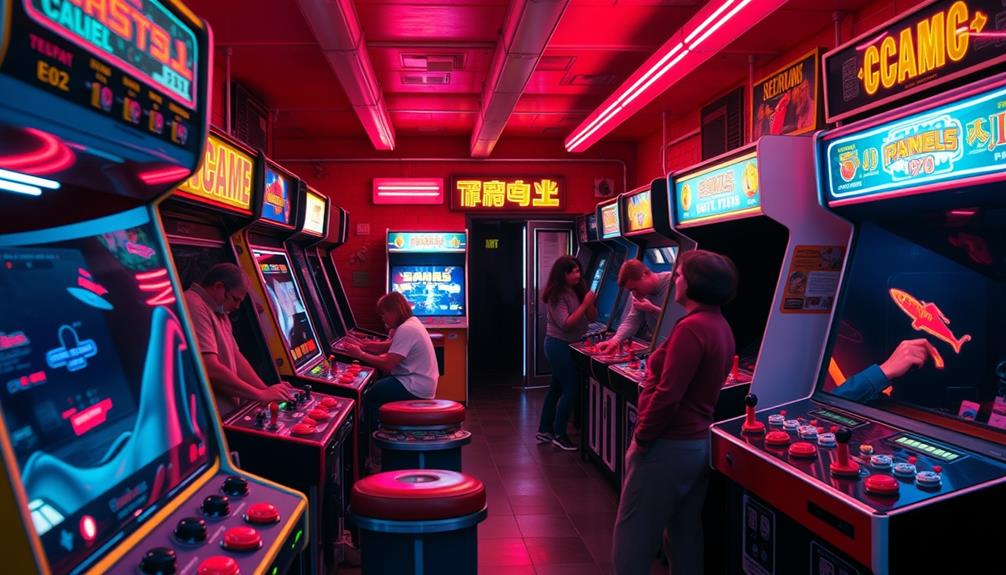
You can see how early innovations in gaming set the stage for what we now recognize as the arcade experience.
The development of iconic machines and the rise of best arcade machines showcased the growing popularity of gaming in social settings.
With the introduction of coin-operated games, players found a new way to enjoy entertainment in public spaces.
This evolution not only transformed leisure activities but also sparked a cultural phenomenon that defined an entire generation.
Early Gaming Innovations
Emerging from the nascent days of technology, arcade games revolutionized entertainment in the early 1970s. The first commercially available arcade video game, Computer Space, hit the market in 1971, laying the groundwork for the arcade gaming industry. Following this, Pong launched in 1972, becoming the first widely successful arcade game and generating considerable demand and revenue.
This transformation in entertainment mirrors the innovations seen in AI-driven platforms that cater to diverse preferences today.
As the years progressed, early gaming innovations continued to shape the landscape:
- Space Invaders (1978) introduced the shoot 'em up genre, turning into a cultural phenomenon that remarkably boosted arcade revenues.
- Pac-Man (1980) transformed the arcade scene, appealing to a broader audience and establishing a lasting franchise that remains relevant today.
- Donkey Kong (1981) marked Mario's debut, introducing a character who'd become iconic in the gaming industry.
These games didn't just entertain; they set the stage for future innovations and established arcade gaming as an essential part of pop culture.
The impact of these early innovations is still felt in today's gaming industry, showcasing the power of creativity and technology.
Coin-Operated Game Evolution
As arcade games gained popularity, the evolution of coin-operated machines began to shape the gaming landscape greatly. It all started with the first commercial arcade game, "Computer Space," which launched in 1971, inspired by the earlier "Spacewar!" in 1962.
However, it was Atari's "Pong," released in 1972, that truly revolutionized video arcade games, becoming the first commercially successful arcade video game and setting the stage for future innovations. This era of gaming can be likened to the transformative journeys seen in celebrity transformations, where iconic moments redefine the landscape.
The introduction of "Space Invaders" in 1978 marked a turning point, establishing the shoot 'em up genre and greatly boosting arcade revenues. This success paved the way for more diverse games.
In 1980, "Pac-Man" emerged, introducing a non-violent mascot and attracting a wider audience, including female gamers. Following this, Nintendo released "Donkey Kong" in 1981, featuring the iconic Mario and solidifying platformer games as a key genre.
Nolan Bushnell's vision and these groundbreaking titles reflect the evolution of arcade games, transforming them into a cultural phenomenon that continues to influence gaming today.
The coin-operated game landscape you see now is a direct result of these pivotal moments in arcade history.
The Birth of Computer Space
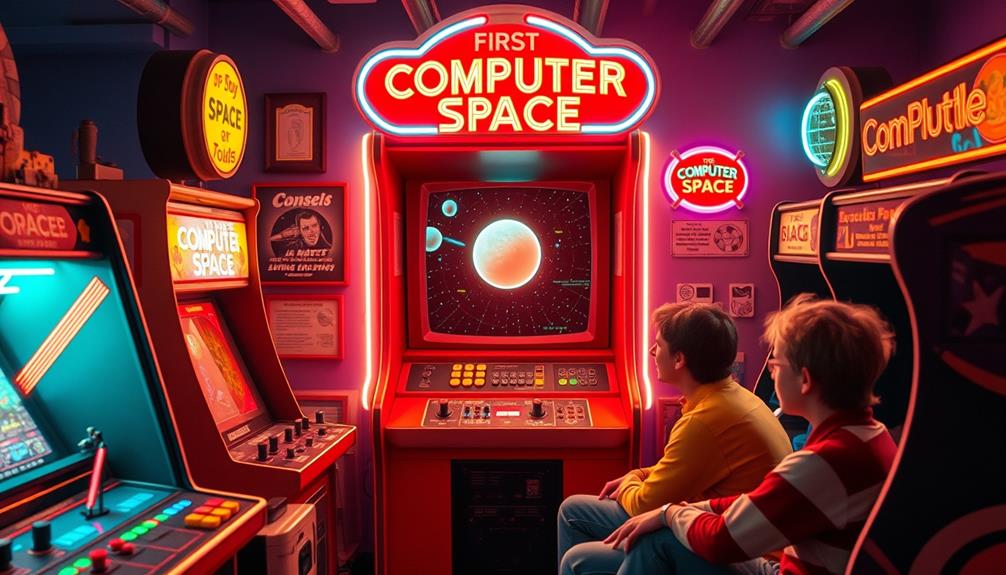
In the early 1970s, the gaming landscape was forever changed with the release of Computer Space, the first commercially available arcade video game. Developed by visionaries Nolan Bushnell and Ted Dabney, this innovative game took inspiration from the classic Spacewar!, created back in 1962.
The launch of Computer Space coincided with a growing interest in interactive entertainment, reflecting the changing cultural attitudes towards leisure activities and technology astrological signs and perceived beauty.
Here's what made Computer Space a pivotal moment in arcade history:
- It featured a two-player mode, allowing players to control rockets while shooting at flying saucers, all set against a mesmerizing starfield backdrop.
- Released in 1971, it marked the dawn of a new era in arcade games, paving the way for future developments.
- Although it faced challenges in the market, selling only between 1,300 and 1,500 units by 1976, its complex gameplay set the stage for further innovation.
The challenges didn't deter its legacy; the success of Computer Space was instrumental in establishing Atari, which would later launch the wildly popular game, Pong, in 1972.
This progression from Computer Space to Pong highlights the rapid evolution of arcade games during this formative period.
Rise of Pong and Popularity
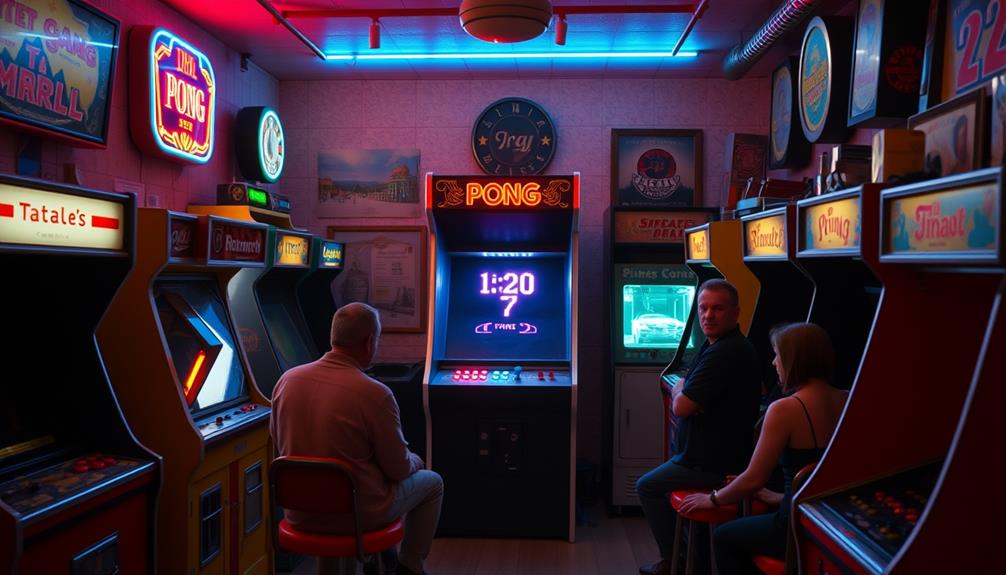
How did Pong become a cultural phenomenon so quickly after its release in 1972? Released by Atari, Pong wasn't just an arcade game; it was the first commercially successful video game, capturing the attention of the gaming market almost instantly. Its simple premise, mimicking table tennis, made it accessible and fun for a broad audience, much like how Nike Tech dominates sneaker culture by merging comfort and style.
You'd find it generating over $40 in daily revenue per machine shortly after launch, which was impressive for the time.
Pong's popularity led to a surge in arcade locations across the United States, markedly boosting the arcade gaming industry in the early 1970s. By 1974, it had sold around 8,000 units in just two years, marking a pivotal shift from traditional amusement games to video arcade gaming.
This success didn't just stop there; it sparked a wave of game development as many manufacturers rushed to clone Pong, hoping to ride its coattails in the burgeoning gaming market.
In a matter of months, Pong transformed not only arcade gameplay but also the entire landscape of the gaming industry, paving the way for future innovations.
The Golden Age of Arcades
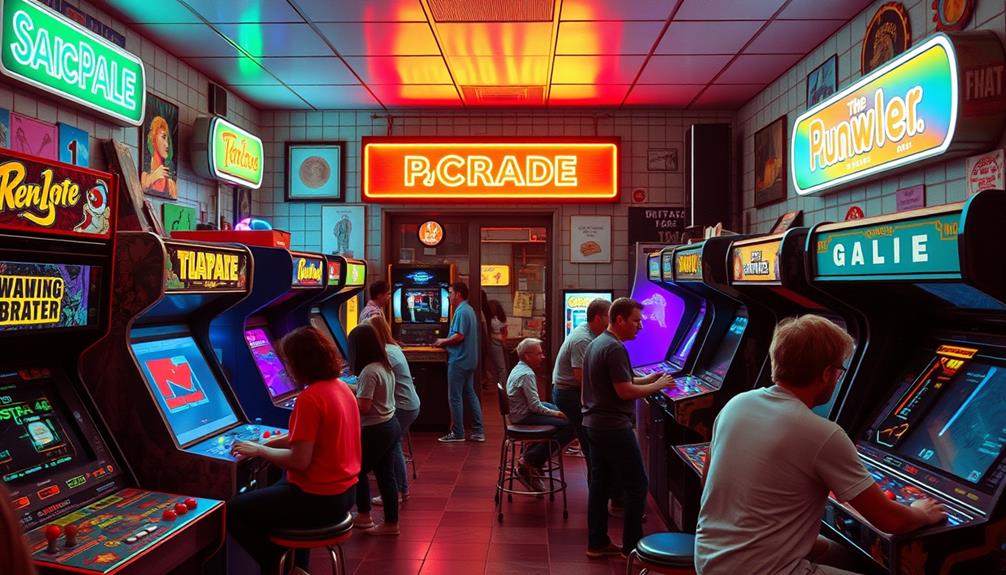
During the late 1970s and early 1980s, arcade gaming experienced a remarkable boom that transformed entertainment culture. This era, often referred to as the Golden Age of Arcades, was defined by several influential games that captured the public's imagination.
The rise of arcade games coincided with a burgeoning interest in competition, much like the current trends seen in young tennis prodigies showcasing exceptional skills at a young age. Here are three key highlights:
- Space Invaders (1978) revolutionized gameplay and introduced the concept of high-score tracking, encouraging players to compete for the top scores.
- Pac-Man (1980) became a cultural phenomenon, featuring iconic characters that remain beloved today.
- Donkey Kong (1981) marked the debut of Mario and introduced a story-driven approach to arcade games, changing the landscape forever.
During this thriving period, arcade revenue peaked at approximately $8.9 billion in 1982, with over 13,000 arcade locations reported across the U.S.
Competitive gaming began to flourish, with tournaments springing up and players aiming to set record scores. This era laid the groundwork for modern esports and solidified arcade games as a significant part of entertainment history.
The Golden Age of Arcades created a vibrant gaming community, forever changing how we view interactive entertainment.
Market Challenges and Decline
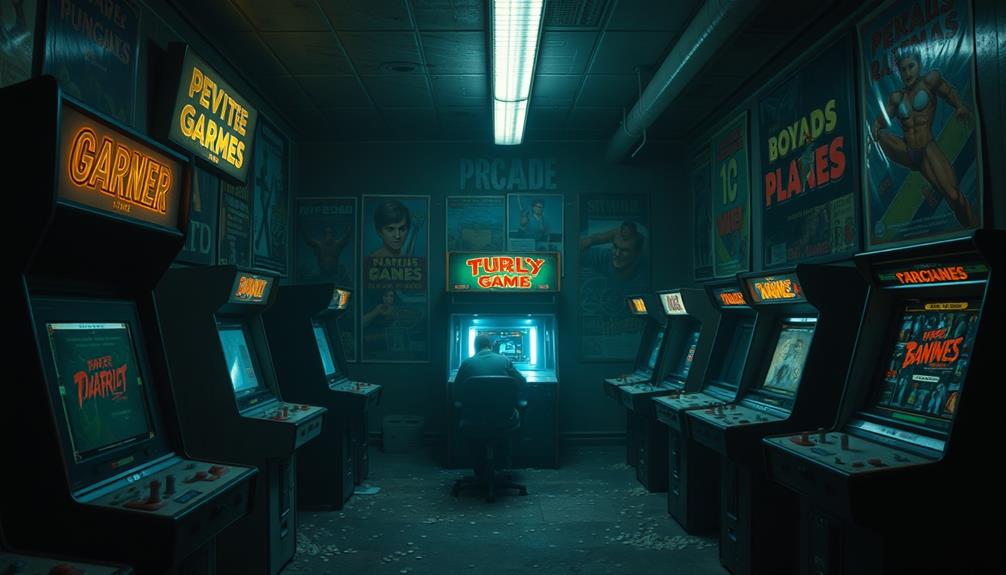
The arcade industry faced significant challenges in the years following its Golden Age, as consumer preferences quickly shifted towards home gaming consoles. This shift caused a dramatic revenue decline, plummeting from $8.9 billion in 1982 to $4.5 billion by 1984, largely due to market saturation and fierce competition.
By 1983, the number of arcade locations in the U.S. was cut in half, leading to the closure of many beloved arcades. Many arcade operators struggled with budget management as they attempted to adapt to changing market conditions.
Although the introduction of software conversion kits and new game genres in the mid-1980s brought a brief recovery, lifting revenue to $5.5 billion by 1988, the arcade market continued to struggle. The rise of home gaming and online play further eroded interest in traditional arcade formats.
As if these challenges weren't enough, the COVID-19 pandemic hit, exacerbating financial difficulties for many operators. Over 8,000 arcade closures were reported in the previous decade, underscoring the ongoing struggles of the arcade industry.
Despite moments of resurgence, the sector battles against a landscape increasingly dominated by at-home entertainment options.
Technological Innovations in Arcades
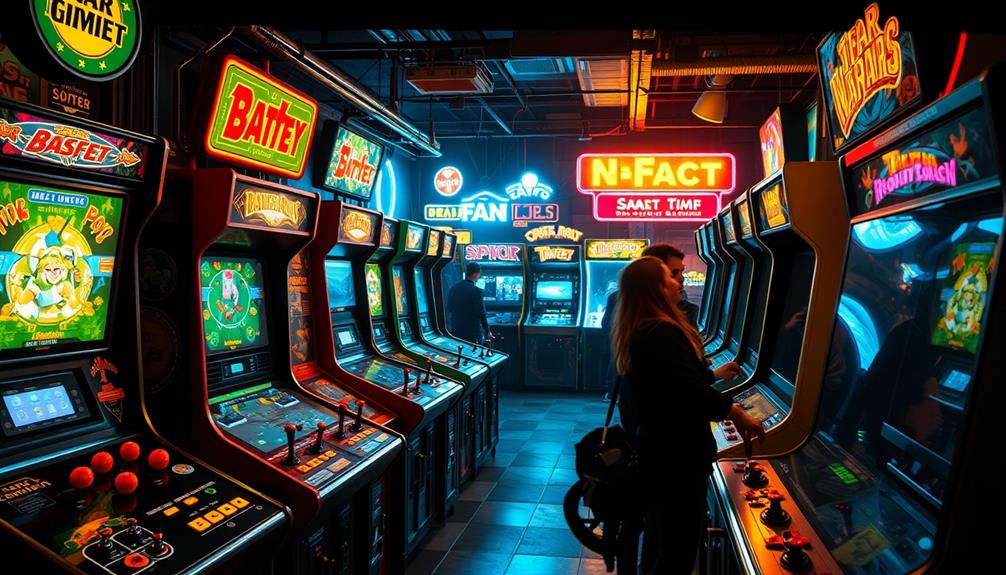
Pioneering advances in technology have greatly shaped the arcade gaming landscape, transforming not just gameplay but also player experiences.
From the debut of Computer Space in 1971 to the rise of 3D graphics, each innovation has left a lasting mark on arcade gaming.
This evolution parallels the development of other gaming formats, such as pinball machines, which began gaining popularity in the United States during the 1940s and 1950s, reflecting a broader trend in arcade entertainment the history of pinball machines.
- Space Invaders (1978) introduced persistent high scores and interactive audio, which not only fascinated players but also drove arcade revenue through the roof, with over 100,000 machines sold in Japan alone.
- In 1983, Dragons Lair showcased the first use of cel-animated video in arcade games, pushing the boundaries of visual storytelling and gameplay technology, and enchanting audiences with its cinematic experience.
- The launch of Street Fighter II in 1991 redefined fighting games by implementing a six-button control scheme, fostering a competitive culture among players and further boosting arcade revenue.
The Future of Arcade Games
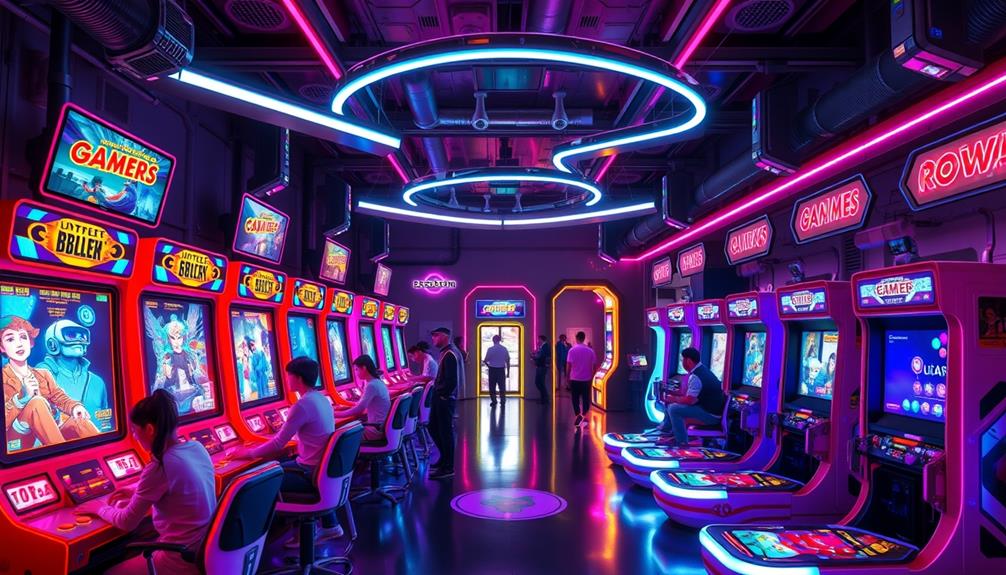
As you look to the future of arcade games, you'll notice a blend of nostalgic game revivals and cutting-edge technology shaping the experience.
Innovations like high refresh rates for gaming and immersive VR environments are set to draw in both seasoned gamers and newcomers alike.
The rise of retro-themed venues, combined with these advancements, is set to invigorate the gaming community while keeping arcades relevant.
Embracing these trends won't only keep arcades relevant but also invigorate the gaming community.
Nostalgic Game Revivals
Nostalgic game revivals are breathing new life into the arcade scene, sparking renewed interest among gamers of all ages. You might find classic arcade titles like Pac-Man rising to fame again, with mobile versions racking up millions of downloads. This trend isn't just about nostalgia; it's about creating unique retro gaming experiences.
Here are three key elements driving this revival:
- Barcades: These venues marry traditional arcade games with social settings, allowing adults to enjoy communal gaming experiences while sipping on a drink.
- Competitive Gaming Tournaments: Esports events are now a staple in arcades, attracting both seasoned players and newcomers keen to compete in classic arcade-style gameplay.
- Redemption Games: Machines like claw games are becoming increasingly popular, drawing in new players who appreciate skill-based rewards.
As nostalgic game revivals continue to reshape the arcade landscape, they're not only appealing to seasoned gamers but also inviting new players to join in the fun.
This blend of old and new guarantees that arcade experiences remain vibrant and engaging well into the future.
Technological Innovations Ahead
The arcade scene is on the brink of an exciting evolution, driven by cutting-edge technology that promises to reshape the way you experience gaming.
The shift from traditional 2D to real-time 3D, marked by systems like Sega's Model 1, revitalized arcade gaming in the early '90s. Today, technological innovations continue this momentum, as companies like Raw Thrills and LAI Games release new titles that blend classic gameplay with modern features.
Competitive gaming has surged in popularity, with events and tournaments rekindling interest in the arcade experience and creating fresh revenue opportunities.
Meanwhile, advances in virtual reality and augmented reality technologies are being explored to offer immersive experiences that attract a new generation of gamers.
Nostalgia-driven trends are also influencing the future of arcades, leading to the rise of adult-oriented arcades and barcades.
These venues combine classic games with social atmospheres, appealing to those who fondly remember the golden age of arcade gaming.
As these innovations unfold, you'll likely find yourself immersed in a dynamic world that honors the past while embracing the future.
Frequently Asked Questions
What Was the Very First Arcade Game?
The very first arcade game was "Computer Space." You control a rocket, shooting at flying saucers while dodging their fire. Despite its complexity, it laid the groundwork for the arcade video game industry.
When Did Arcade Games Become Popular?
You might think arcade games always existed, but they really took off in the early 1970s. With hits like "Pong" and "Pac-Man," they captured imaginations and transformed into a major entertainment phenomenon by the 1980s.
Did People Go to Arcades in the 80S?
Yes, you'd find crowds flocking to arcades in the '80s. Popular games like "Pac-Man" and "Space Invaders" drew diverse audiences, turning arcades into vibrant social hubs where competition and community thrived.
What Era Were Arcade Video Games?
You'll find that arcade video games flourished during the late 1970s to early 1980s. This era introduced iconic titles, captivated audiences, and laid the groundwork for the gaming culture we enjoy today. It's truly remarkable!
Conclusion
As you step away from the flashing screens and nostalgic beeps of arcade games, remember their journey from humble beginnings to a cultural phenomenon. These digital playgrounds, once teetering on the edge of extinction, now pulse with renewed life, blending old-school charm with cutting-edge technology. Just like a classic game, the future of arcades invites you to play, adapt, and explore, ensuring that the joy of gaming will never be a pixelated memory, but a vibrant reality.
